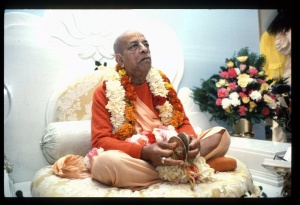SB 3.15.12: Difference between revisions
m (1 revision(s)) |
(Vanibot #0018 edit: make synonym terms in Sanskrit italic in SB - Vanisource) |
||
| Line 1: | Line 1: | ||
{{info | {{info | ||
|speaker=Lord | |speaker=Lord Brahmā | ||
|listener=Demigods | |listener=Demigods | ||
}} | }} | ||
[[Category:Srimad-Bhagavatam - Canto 03 Chapter 15]] | |||
[[Category:Bhagavatam Verses Spoken by Lord Brahma - Vanisource|031512]] | |||
<div style="float:left">'''[[Srimad-Bhagavatam]] - [[SB 3|Third Canto]] - [[SB 3.15: Description of the Kingdom of God|Chapter 15: Description of the Kingdom of God]]'''</div> | |||
<div style="float:right">[[File:Go-previous.png|link=SB 3.15.11]] '''[[SB 3.15.11]] - [[SB 3.15.13]]''' [[File:Go-next.png|link=SB 3.15.13]]</div> | |||
{{RandomImage}} | |||
==== TEXT 12 ==== | ==== TEXT 12 ==== | ||
<div | <div class="verse"> | ||
brahmovāca | :brahmovāca | ||
mānasā me sutā yuṣmat- | :mānasā me sutā yuṣmat- | ||
pūrvajāḥ sanakādayaḥ | :pūrvajāḥ sanakādayaḥ | ||
cerur vihāyasā lokāl | :cerur vihāyasā lokāl | ||
lokeṣu vigata-spṛhāḥ | :lokeṣu vigata-spṛhāḥ | ||
</div> | </div> | ||
| Line 17: | Line 23: | ||
==== SYNONYMS ==== | ==== SYNONYMS ==== | ||
<div | <div class="synonyms"> | ||
brahmā | ''brahmā uvāca''—Lord Brahmā said; ''mānasāḥ''—born from the mind; ''me''—my; ''sutāḥ''—sons; ''yuṣmat''—than you; ''pūrva-jāḥ''—born previously; ''sanaka-ādayaḥ''—headed by Sanaka; ''ceruḥ''—traveled; ''vihāyasā''—by traveling in outer space or flying in the sky; ''lokān''—to the material and spiritual worlds; ''lokeṣu''—among the people; ''vigata-spṛhāḥ''—without any desire. | ||
</div> | </div> | ||
| Line 24: | Line 30: | ||
==== TRANSLATION ==== | ==== TRANSLATION ==== | ||
<div | <div class="translation"> | ||
Lord Brahmā said: My four sons Sanaka, Sanātana, Sanandana and Sanat-kumāra, who were born from my mind, are your predecessors. Sometimes they travel throughout the material and spiritual skies without any definite desire. | Lord Brahmā said: My four sons Sanaka, Sanātana, Sanandana and Sanat-kumāra, who were born from my mind, are your predecessors. Sometimes they travel throughout the material and spiritual skies without any definite desire. | ||
</div> | </div> | ||
| Line 31: | Line 37: | ||
==== PURPORT ==== | ==== PURPORT ==== | ||
<div | <div class="purport"> | ||
When we speak of desire we refer to desire for material sense gratification. Saintly persons like Sanaka, Sanātana, Sanandana and Sanat-kumāra have no material desire, but sometimes they travel all over the universe, out of their own accord, to preach devotional service. | When we speak of desire we refer to desire for material sense gratification. Saintly persons like Sanaka, Sanātana, Sanandana and Sanat-kumāra have no material desire, but sometimes they travel all over the universe, out of their own accord, to preach devotional service. | ||
</div> | </div> | ||
__NOTOC__ | |||
<div style="float:right; clear:both;">[[File:Go-previous.png|link=SB 3.15.11]] '''[[SB 3.15.11]] - [[SB 3.15.13]]''' [[File:Go-next.png|link=SB 3.15.13]]</div> | |||
__NOTOC__ | |||
__NOEDITSECTION__ | |||
Revision as of 18:15, 30 November 2017

A.C. Bhaktivedanta Swami Prabhupada
TEXT 12
- brahmovāca
- mānasā me sutā yuṣmat-
- pūrvajāḥ sanakādayaḥ
- cerur vihāyasā lokāl
- lokeṣu vigata-spṛhāḥ
SYNONYMS
brahmā uvāca—Lord Brahmā said; mānasāḥ—born from the mind; me—my; sutāḥ—sons; yuṣmat—than you; pūrva-jāḥ—born previously; sanaka-ādayaḥ—headed by Sanaka; ceruḥ—traveled; vihāyasā—by traveling in outer space or flying in the sky; lokān—to the material and spiritual worlds; lokeṣu—among the people; vigata-spṛhāḥ—without any desire.
TRANSLATION
Lord Brahmā said: My four sons Sanaka, Sanātana, Sanandana and Sanat-kumāra, who were born from my mind, are your predecessors. Sometimes they travel throughout the material and spiritual skies without any definite desire.
PURPORT
When we speak of desire we refer to desire for material sense gratification. Saintly persons like Sanaka, Sanātana, Sanandana and Sanat-kumāra have no material desire, but sometimes they travel all over the universe, out of their own accord, to preach devotional service.